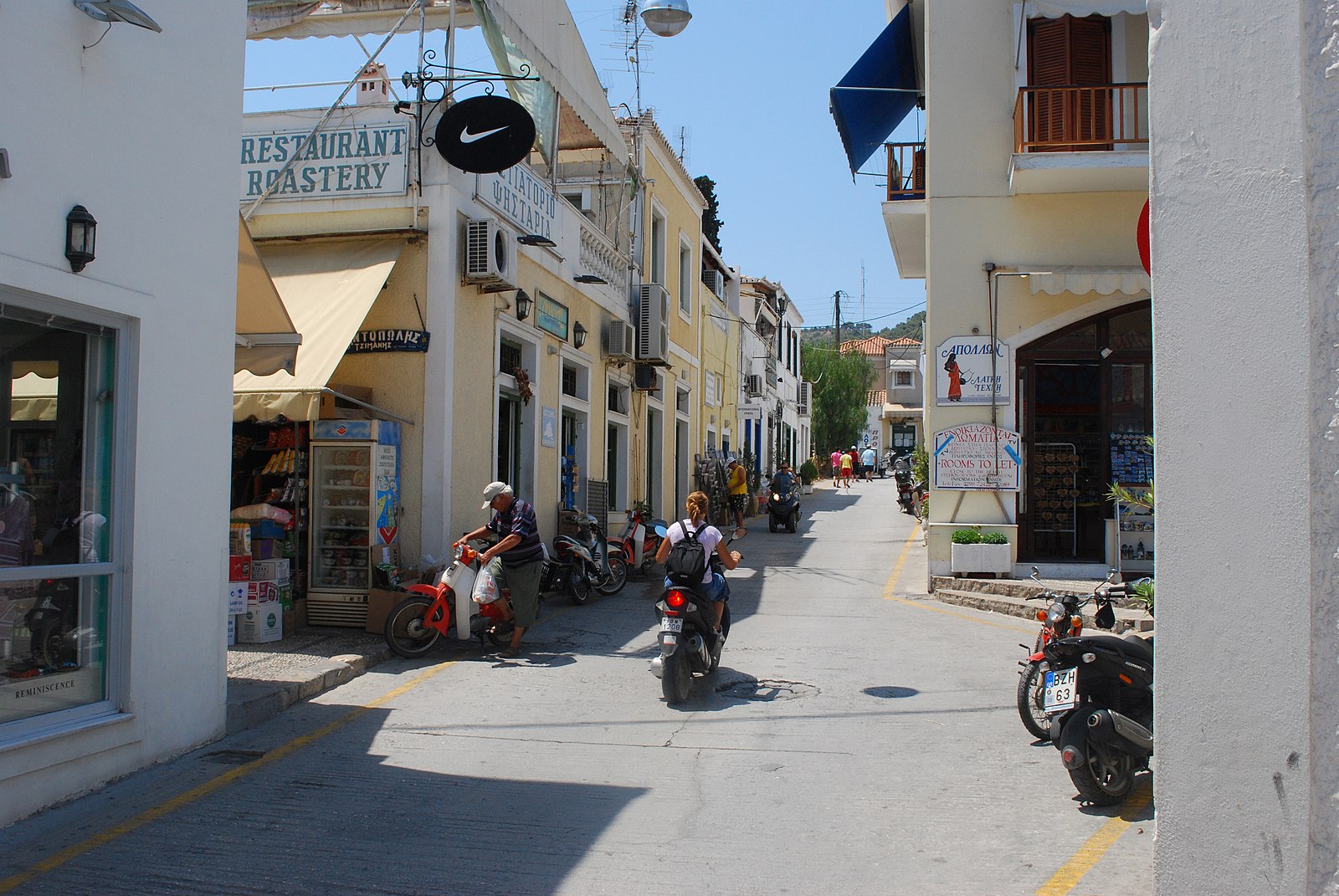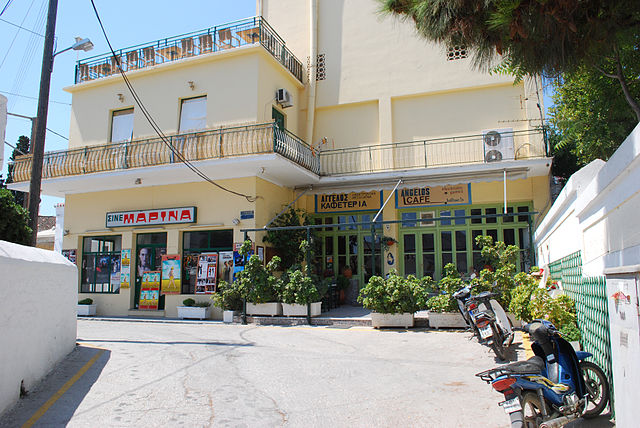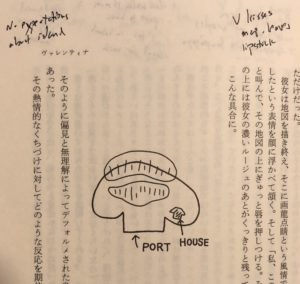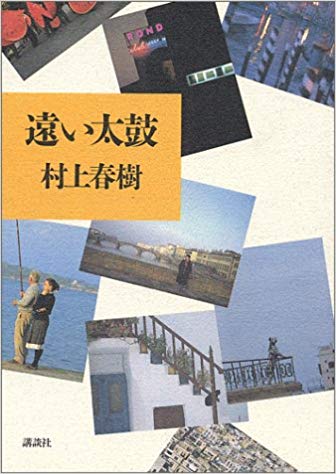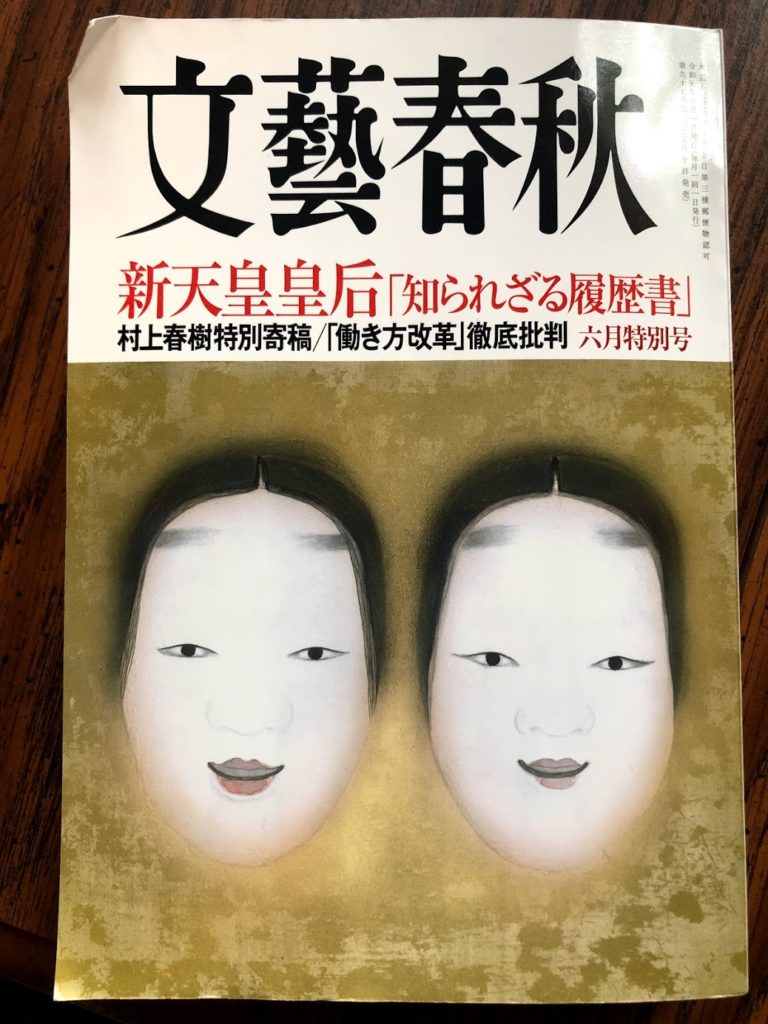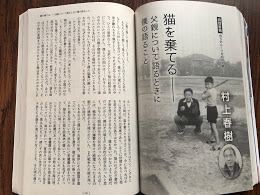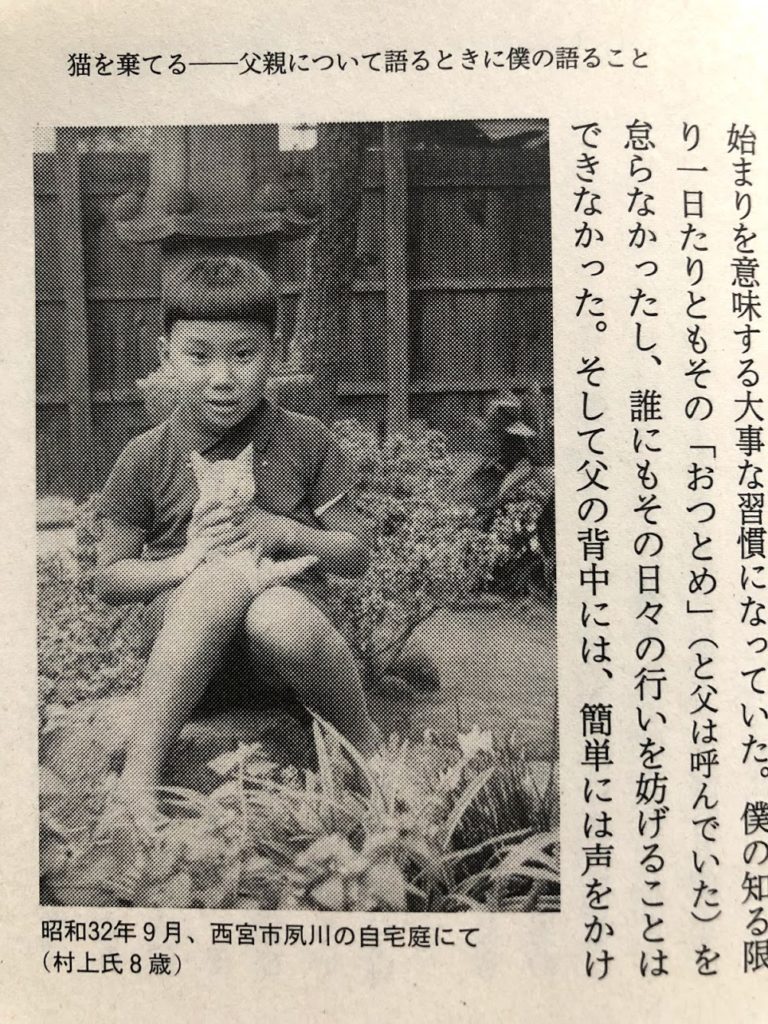Week four of Murakami Fest 2020!
Previous Murakami Fest Posts:
Year 1: Boobs, The Wind, Baseball, Lederhosen, Eels, Monkeys, and Doves
Year 2: Hotel Lobby Oysters, Condoms, Spinning Around and Around, 街・町, The Town and Its Uncertain Wall, A Short Piece on the Elephant that Crushes Heineken Cans
Year 3: “The Town and Its Uncertain Wall” – Words and Weirs, The Library, Old Dreams, Saying Goodbye, Lastly
Year 4: More Drawers, Phone Calls, Metaphors, Eight-year-olds, dude, Ushikawa, Last Line
Year 5: Jurassic Sapporo, Gerry Mulligan, All Growns Up, Dance, Mountain Climbing
Year 6: Sex With Fat Women, Coffee With the Colonel, The Librarian, Old Man, Watermelons
Year 7: Warmth, Rebirth, Wasteland, Hard-ons, Seventeen, Embrace
Year 8: Pigeon, Edits, Magazines, Awkwardness, Back Issues
Year 9: Water, Snæfellsnes, Cannonball, Distant Drumming
Year 10: Vermonters, Wandering and Belonging, Peter Cat, Sushi Counter, Murakami Fucks First
Year 11: Embers, Escape, Window Seats, The End of the World
Year 12: Distant Drums, Exhaustion, Kiss, Lack of Pretense, Rotemburo
Year 13: Murakami Preparedness, Pacing Norwegian Wood, Character Studies and Murakami’s Financial Situation

Photo from Wikimedia Commons.
This chapter is titled “Retreat from Mykonos.” Murakami is leaving Mykonos, and during the day of departure his mind is preoccupied with Napoleon’s retreat from Russia.
The retreat seems tied in with the terrible weather (it’s rained almost the whole month, it’s raining again as he leaves) and some of the frustrations he’s faced during his time there: He’s working extremely hard on his writing, and he’s had some run-ins with an annoying foreigner living on Mykonos.
The retreat gets blended in with his own experience, a technique that he explores more in depth a few years later in The Wind-up Bird Chronicle through Cinnamon Akasaka, who has a divided self and writes out his grandfather’s vivid experiences in Manchuria. You could also argue that the technique dates back to one of his earliest short stories—“A Poor-Aunt Story.” Although the rain section below more closely mirrors that story. It’s a striking effect. Here’s how the chapter begins:
December 28, 1986. Sunday. Rain.
I’m leaving this island today.
I woke up at 6:30, sat at my desk and worked on the novel for an hour, and then put the bundle of papers into a large envelope when I made it to a temporary stopping place. Then I placed this securely at the bottom of my suitcase so it wouldn’t get folded. Today is also the end of my stay on Mykonos. However, now that I think about the month and a half I’ve lived here, the weather has been awful the entire time. Once or twice a week we’d get perfectly clear days. But other than that it was terrible. It rained, or it was windy, or it was rainy and windy. And most days the sky was gloomily overcast. We were surrounded by beautiful coastline, but I was only able to get in the water and go swimming once.
In the end, our final day here is rainy as well. A silent, misty rain. The wind is also blowing.
一九八六十二月二十八日。日曜日。雨。
僕は今日この島を出て行こうとしている。
六時半に起きて、机に向かって一時間ばかり小説の続きを書き、とりあえずのきりがついたところで、そのレターペーパーの束を大判の封筒に入れる。そしてしわにならないように、しっかりとしたスーツケースの一番底にしまいこむ。今日でミコノスの滞在も終わりである。しかし考えてみればここで暮らした一ヵ月半、まったくひどい天気ばかりだった。週に一日か二日、からりと晴れた美しい日がやってくる。でもあとはひどいものだ。雨が降るか、風が吹くか、あるいは雨が降って風が吹くかだ。そして空はたいていどんより暗く曇っている。こんなに美しい海岸に囲まれていながら、実際に海に入って泳ぐことができたのはたった一度だけだった。
結局最後の日も雨だ。細かい無音の雨。風も吹いている。
I’ll pause here and offer some commentary, the only commentary necessary: Can you imagine if he’d somehow lost his luggage or if the manuscript had been otherwise destroyed?! Obviously, writing by hand was the only option for Murakami at the time, but it feels so tenuous! I wonder whether he tried to make copies of his manuscripts or if he mailed it back to his editor in Japan. We do know that he when he submitted his first novella, the story that would become Hear the Wind Sing, he mailed his only copy to Gunzō. (I can’t seem to track down where Murakami has noted this. I thought for sure I’d blogged about it, but the best I can find in my archives is the fact that he’d completely forgotten that he’d submitted to the contest. UPDATE: Thank you to Mikhail in the comments who notes that Murakami makes this claim in What I Talk About When I Talk About Running.) I’ll have to read more chapters and find out if he mentions what he did in Europe.
Murakami continues:
Just behind the house we rented is a modest sheep pasture (although it’s basically just a empty field), and usually there are 30 to 40 sheep grazing there. From time to time the shepherds, a mean couple (they look straight out of one of Dickens’ novels) come over and hit the sheep who don’t listen with a crook, unleashing a stream of foul curses at them as they do. I can look out over the whole pasture from the window in front of my desk. I kind of started looking forward to those pauses in my work when I happened to lift my eyes and see a mother sheep with her lambs from the window, but winter has deepened and the grass grown more scarce, and ten days ago every last one of the sheep were transferred to a different pasture. Now there is only a barren, brown expanse of ground beneath the window. Gone are the lambs clinging desperately to their mother’s legs, and gone are their monotonous, sing-song bleats that seemed to be underlined with a ruler. When I look at the empty pasture, it’s clear that the season has wrenched away its fair share.
Beyond the pasture is a road that runs up to the mountains, and an old truck filled with what looks like construction materials lurches its way up. The misty morning rain chills and dampens everything on the ground. As I glance outside, I think about the chapter I just finished writing. When I write on a rainy morning, somehow it ends up being writing that feels like a rainy morning. No matter how much work I put into it later on, I can never get the scent of that morning rain out of it. The scent of the rain falling silently on the lonely pasture, from which each and every sheep has disappeared. The scent of the rain that covered that old truck crossing the mountains. My writing is redolent with that morning rain. Partly out of fate.
我々の借りた家のすぐ裏手に、ささやかな羊の放牧地(というよりはただの原っぱみたいなものだけれど)があって、そこにはだいたい三十頭から四十頭の羊たちが放し飼いにされていた。ときどき意地の悪そうな羊飼いの夫婦がやってきて(ディケンズの小説に出てきそうな風貌のカップルである)、杖で言うことをきかない羊たちを口ぎたなくののしりながらひっぱたいた。机の前の窓から、その放牧地を見渡すことができた。僕は仕事のあいまにふと目を上げて、窓から羊の母子の姿を眺めるのをささやかな楽しみにしていたのだが、冬が深まるにつれて草はどんどん乏しくなり、羊たちは十日ばかり前に一頭残らずどこかべつの放牧地に移送されてしまった。今では貧相な茶色の地面が窓の下にがらんと広がっているだけだ。母羊の脚に必死にしがみつく子羊たちの姿ももう見られないし、あの定規で引いたように抑揚のない一本調子の鳴き声ももう聞こえない。からっぽの放牧地を見ていると、季節がその取りぶんをしっかりともぎとって行ってしまったことがよくわかる。
放牧地の向こうには山に向かう坂道があり、古いトラックが建材のようなものを積んで、よたよたと山を登っていく。朝の細かい雨が地表のありとあらゆるものを冷たく濡らしている。僕はぼんやりと外を眺め、さっき書き終えたばかりの章のことを考える。雨の朝に文章を書くと、どういうわけかそれは雨の朝のような文章になってしまう。あとでどれだけ手を入れてみても、その文章から朝の雨の匂いを取り去ることはできない。羊たちが一頭残らず失われてしまった寂しい放牧地に、音もなく降る雨の匂い。山を越えていく古びたトラックを濡らす雨の匂い。僕の文章はそんな雨の朝の匂いに包まれている。半分運命的に。
This is the section that strikes me as most like “A Poor-Aunt Story.” I love the idea that something from the writer’s current situation and self are imprinted on the work. If you think about it, there are parts of Norwegian Wood that do have the kind of gray, melancholic frustration that Murakami is describing here.
Murakami continues with breakfast after his writing:
I go downstairs and heat up some water and grill pancakes. Today is our last day, so I have to find a clever way to use up each and every item that’s left in the refrigerator. We have a little pancake mix, milk, and eggs left in the fridge. So anyone would come to the conclusion we’re having pancakes for breakfast.The balance between the mix, eggs, and milk is slightly off, but I guess there’s nothing we can do about it. That’s part of taking care of leftovers. Left over—as I cut the pancakes into small pieces and bring them to my mouth, I find myself thinking of Napoleon’s retreat from Russia. The most difficult retreat with the least to gain. Cossack troops dominate fields covered in snow. Blizzards. The sound of cannons.
My wife asks, Want some tomato?
We have a lot of tomato left over. I’ll have some, I say. I cut the tomato, add some salt and lemon juice, and sprinkle on some herbs I cut up. Coffee, pancakes, and tomato salad, soldiers cross frozen rivers, and destroy bridges with their hands growing numb. They are so far from home.
僕は階下に下りてキッチンで湯を温めてパンケーキを焼く。今日が最後の日なので、冷蔵庫の中にのこっているものをひとつひとつ手際よく片付けていかなくてはならないのだ。冷蔵庫の中にはパンケーキの粉が少しとミルクと卵が残っている。だからこれは誰がどう考えても朝御飯はパンケーキということになる。粉と卵と牛乳のバランスがいささか悪いが、これはまあ仕方ないだろう。残りものを片づけるというのはそういうことなのだから。残りもの---僕はそんなパンケーキを小さく切って口に運びながら、ふとナポレオンの軍隊がロシアから撤退した時のことを思い出す。いちばん難しく、いちばん得るところの少ない撤退戦。雪原を跳梁するコサック兵。雪嵐。砲声。
トマト食べる?と女房が尋ねる。
トマトがいっぱい余っているよ。食べる、と僕は言う。トマトを切って塩とレモン汁をかけ、香草を刻んでふりかける。コーヒーとパンケーキとトマトのサラダ、兵士たちは凍てつく河を渡り、かじかむ手で橋を焼き落とす。彼らはあまりにも遠く故郷を離れたのだ。(162-164)
This is really just the start of this technique, but you can already see how he weaves his mental experience in with the physical environment. His wife’s interruption is on its own line, bringing us back to reality before Murakami deals with the tomatoes and then gradually sinks back into his thought process.
As a literary work, this might be the most interesting chapters so far.
The other interesting connection with Norwegian Wood/Murakami’s oeuvre is Murakami’s generational angst. Murakami has been pretty critical of people who protested in the late-60s only to sell out and join the Bubble era. We see this implicitly in Norwegian Wood: the narrator is a writer, still suffering from psychological wounds from the past, while his classmate Nagasawa goes on to serve as a MOFA officer after having treated his girlfriend Hatsumi so poorly. Hatsumi gets married and seems to go on to a happy life but ends up committing suicide. In one of the rare glimpses of the narrator’s present, there’s a scene when he’s on a job in Santa Fe with the sun setting beautifully, which reminds him of Hatsumi’s tragedy.
We also see this outlook in short stories like “Poolside” from Dead Heat on a Merry-go-round and in “A Folklore of My Generation: A Prehistory of Late-Stage Capitalism.”
But in this chapter Murakami ends us seeming like the cynical one. Later on in the chapter he has an encounter with “Belgian John,” a foreigner who comes by to collect the electric bill. He’s ended up on Mykonos after becoming disillusioned with mass publication and abandoning his dreams of working as an editor in publishing. John seems like a condescending jerk, and Murakami is pretty critical of his “turn on, tune in, drop out” attitude. He dismisses him as a Baby Boomer, a relic of the 60s.
I think ultimately the criticism seems to be leveled at a lack of effort. Belgian John isn’t even trying to stay connected. It’s an interesting section. I won’t excerpt any of it here, but it’s worth a read if you’re looking at Murakami from this perspective or just want to see his writing style.
***
I mentioned this two weeks ago, but it’s worth posting the link again: Murakami revisits Mykonos 24 years later in 2010 and writes about the experience in an essay that was part of the collection 『ラオスにいったい何があるというんですか?』(What Exactly Do They Say is in Laos?). I wrote about it four years ago. Murakami revisits the apartment where they stayed but seems to have forgotten that the winter drove off the sheep when he lived there the first time.




